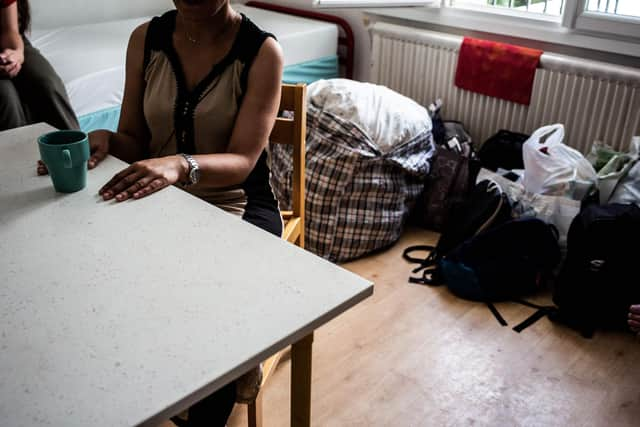Domestic abuse in Scotland: How some women are refused a safe refuge because of their immigration status – Mariam Ahmed


With the help of Police Scotland, I did everything I could to help her get to a place of safety and away from her abusers.
Shortly after, I was advised that the woman was not eligible to stay in any refuge or homeless accommodation, making her destitute. I thought there must be some mistake, how can anyone possibly not offer this woman a place of safety? Women are at a higher risk of harm and danger when they are fleeing abuse, so this was a crucial time for her to be kept safe.
Advertisement
Hide AdAdvertisement
Hide AdFor migrant women, having ‘no recourse to public funds’ (NRPF) on their passport makes them ineligible for welfare and housing benefits. Unable to afford local authority or refuge accommodation, many women are then trapped with their abusive partner. Due to a lack of security and rights, these women are coercively controlled and financially abused.
Facing destitution with no support, the woman in question was forced to stay with community members. After many weeks of advocacy and heated discussions, they managed to get her accommodated by the Home Office. The impact this had on the woman – after leaving her abuser, then having to beg and plead to be housed – was very difficult to witness.
The realisation that women were being refused a place of safety for having this one stamp on their passport was a major wake-up call about the breach of human rights that was a result of the Home Office’s hostile policies. I naively hoped NRPF cases were not common. Unfortunately,12 years on, I’ve met countless women in a similar situation and continue to support those who face the same barriers with very little progress made.
Women who have a spousal or fiancé visa who leave abusive situations can apply for a ‘destitute domestic violence concession’. This allows them to have benefits and funds paid for a refuge space.


However, they are immediately left dealing with the stress of the immigration process and must prove they are victims of domestic abuse to the Home Office.
Instead of coming to terms with the trauma of what they have just gone through in their abusive relationship, they must gather evidence that demonstrates they have experienced abuse to ensure that they can remain in the UK.
Women from the European Union are also facing harsh restrictions due to the impact of Brexit. Women arriving in the UK from another European country are not eligible for benefits – that usually requires ‘settled status’. If they are experiencing abuse, they will not have benefits for local authority housing or refuge and would have to pay for the accommodation themselves.
I watched a woman being evicted from a refuge due to unpaid housing benefit. She became ineligible for Universal Credit as Brexit meant there were new criteria to qualify for benefits which she did not meet.
Advertisement
Hide AdAdvertisement
Hide AdAs she had young children, social work was paying for a small room in a B&B. She had no choice but to stay in a tiny room with no cooking facilities for the children’s dinner, no television, no space for children to play and had to share bathrooms with strangers.
All of this takes an emotional toll on women and children living in these circumstances. What is particularly astonishing is that a small room costs social work around £100 a night – this is more expensive than paying for refuge accommodation or a temporary homeless flat.
When supporting women with NRPF and children, social work still funds B&B rooms rather than a refuge where a whole flat would be less than half price and provide much better suited accommodation.
So, where are we now in supporting women with NRPF? Scotland has its own laws in relation to domestic abuse. In the Westminster Parliament, the new Domestic Abuse Bill was introduced and was welcomed as a ground-breaking piece of legislation in response to domestic abuse.
It did not initially protect the rights of migrant women experiencing abuse, but the House of Lords added amendments to the Bill which would have ensured women experiencing domestic abuse could access a place of safety regardless of their NRPF status. These amendments would have also applied to all migrant women with NRPF living in Scotland.
However, the Bill went back to the House of Commons on April 15 and, unfortunately, the Lords’ amendments were rejected by the Commons, so migrant women experiencing domestic abuse will not have equal protection under the new law when passed.
These amendments were rejected despite the endless evidence of the harmful impact to migrant women accessing safety. This Bill was an historic opportunity to provide equal protection to all women that was missed due to the government’s reluctance to provide rights to migrant women.
Migrant women have been ignored by the immigration system that has allowed this inequality to exist for far too long, and this will continue to be the case.
Advertisement
Hide AdAdvertisement
Hide AdThe only way we can bring about a positive impact for migrant women fleeing domestic abuse and trying to access safety in Scotland is to amend the immigration laws. This cannot be done in Scotland alone as immigration is not a devolved power. Women’s rights groups will continue to campaign and highlight these injustices, until all women can have equal access to safety.
Mariam Ahmed is the co-chief executive of Amina (an organisation that supports Muslim and BME women) and an independent consultant specialising in domestic abuse advocacy for ethnic minority women in Scotland
